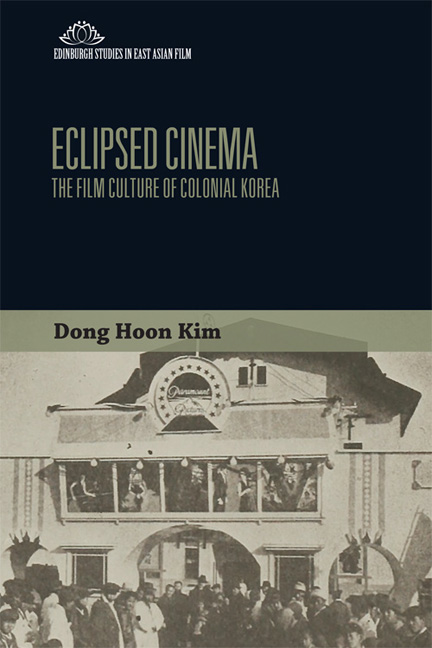Book contents
- Frontmatter
- Contents
- List of Figures
- Acknowledgements
- Introducing Joseon Cinema: the Question of Film History and the Film Culture of Colonial Korea
- 1 The Beginning: Towards a Mass Entertainment
- 2 Joseon Cinema, Cinematic Joseon: on Some Critical Questions of Joseon Cinema
- 3 Migrating with the Movies: Japanese Settler Film Culture
- 4 Colonial Film Spectatorship: Nationalist Enough?
- 5 Film Spectatorship and the Tensions of Modernity
- Conclusion: Integrating into the Imperial Cinema
- Notes
- Appendix
- Bibliography
- Index
1 - The Beginning: Towards a Mass Entertainment
Published online by Cambridge University Press: 03 January 2018
- Frontmatter
- Contents
- List of Figures
- Acknowledgements
- Introducing Joseon Cinema: the Question of Film History and the Film Culture of Colonial Korea
- 1 The Beginning: Towards a Mass Entertainment
- 2 Joseon Cinema, Cinematic Joseon: on Some Critical Questions of Joseon Cinema
- 3 Migrating with the Movies: Japanese Settler Film Culture
- 4 Colonial Film Spectatorship: Nationalist Enough?
- 5 Film Spectatorship and the Tensions of Modernity
- Conclusion: Integrating into the Imperial Cinema
- Notes
- Appendix
- Bibliography
- Index
Summary
The winter night is getting longer, and the snow-covered ground makes us feel truly desolate. If you come to our theatre when all these sorts of winter feelings stir you up, the hearth would warm your body, and every time marvelous pictures you have never seen before are projected on the snowwhite screen, you would suddenly find yourself thinking, ‘This must be the real paradise’. Hence our belief that you would not find a better evening's entertainment than this. (From an advertisement for Danseongsa Theatre's reopening, Maeil sinbo, 21 December 1918)
The 1920s in colonial Korea dawned in a maelstrom of apprehension, unrest, and uncertainty. Social tensions became palpable in January 1919 when Gojong, the twenty-sixth king of the Joseon dynasty and first emperor of the Korean Empire who was dethroned by Japan in 1907 when Korea was the protectorate of Japan (1905–10), passed away. His sudden and untimely death generated a rumour that he might have been poisoned by Japanese officials which many Koreans accepted as a fact at the time of the death. It ignited an explosion of the tensions between the colonisers and colonised that had been escalating for decades since even before Japan's official colonisation of Korea in 1910. Just a couple of months after Gojong's death, the March First Independent Movement, the first nationwide nationalist movement organised by nationalists, ensued and soon swept Joseon with a nationalist fervour that took over half a million demonstrators into the streets within a couple of months. This first national-scale uprising was swiftly countered by the colonial authorities’ ruthless measures that led to the arrest of tens of thousands of demonstrators. A month later, the Provisional Government of the Republic of Korea, a Korea government in exile, was established by exiled nationalists in Shanghai, China. Seeing the deterioration of the situation in the colony, Tokyo realised that the military-led colonial rule, built on coercion and overtly discriminative policy, had failed and thus reached the decision to replace high-ranking officials of the colonial government of Korea, including Governor General Hasegawa Yoshimichi, and initiate major reform in the colonial rule.
- Type
- Chapter
- Information
- Eclipsed CinemaThe Film Culture of Colonial Korea, pp. 13 - 54Publisher: Edinburgh University PressPrint publication year: 2017



